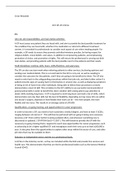Cerys Woodard
Unit 18: All criteria
P1:
Job role, job responsibilities, and main duties/activities:
A GP must assess any patient they are faced with, and aim to provide the best possible treatment for
the condition they are faced with, whether it be medication or referral to different treatment
centres. It is essential for professionals to consider each aspect of care when treating people. For
example, a GP needs to ensure they promote anti-discriminatory practise, by having respect for
religious beliefs, moral beliefs, and values, in addition to empowering patients, and emphasising
promotion of choice, and promotion of rights. This will ensure the professional is carrying out their
main duties, and providing patients with the best possible care for the patients and their needs.
Multi-disciplinary working, skills, hours, shifts/flexitime, and salary/pay:
The GP can also use team work when referring patients to other services, by sharing opinions and
sending over medical details. This is a crucial task for the GP to carry out, as well as needing to
consider the outcomes for the patients, and if they are going to be beneficial to them. The GP also
needs to refer back to the safeguarding procedures within their job role, and take further action if a
patient presents signs of causing harm to themselves or anyone else, as well as displaying symptoms
of being at risk of harm from other individuals. Being able to follow these procedures correctly
demonstrates a level of skill. This correlates to the GP’s ability to use successful communication d
good practical skills in order to benefit the client. Another skill is being able to pay attention to
detail, while working long hours. A GP is required to work long hours and work a lot of shifts, which
demonstrates not only their skill, but the level of flexibility; depending on how many GPs are within
one doctor’s surgery, depends on how flexible their work can be – the more people, the more
flexible and vice versa. This results in an average salary of £90,000.
Qualifications, on-going training, and opportunities for career progression:
In order to become a GP, you need to have sustained a medical degree, and have at least 5 GCSEs,
ranging between a B and an A*. This will then be partnered with on-going training once someone
becomes a GP. There will be further training available often, and whenever something new is
discovered or updated. [ CITATION Gen19 \l 2057 ]. This will therefore provide the GP with the
necessary on-going training that is required to reach new opportunities for career progression, such
as advancing to be a higher qualified GP, and managing to work their way up to at least £200,000 a
year. It also gives them the opportunities to explore other areas within this sector of care, and other
job roles that may be available to them.
Statutory or independent sector and ties to a professional body:
A GP lies in the statutory sector, as they are included within the NHS and provide free services and
health care. This demonstrates that they are tied to professional bodies such as the General Medical
Council (GMC).




